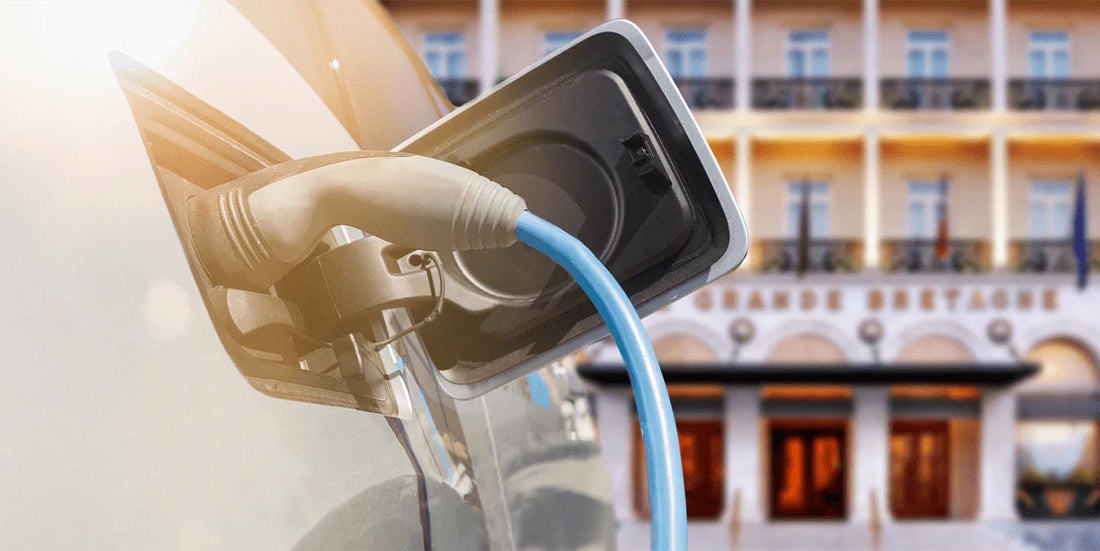
The Future of Hospitality: How EV Charging Stations Are Transforming Hotel Profitability
Share
As electric vehicles (EVs) continue to dominate the automotive landscape—with global sales projected to hit 14 million units by 2025 —hotels are rapidly adopting EV charging infrastructure to stay competitive. This shift isn’t just about sustainability; it’s a strategic move to attract tech-savvy guests, boost revenue, and future-proof operations. Here’s a deep dive into the advantages and monetization opportunities of integrating EV charging into your hotel’s offerings.

1. Market-Driven Demand: Attracting the EV-Owner Demographic
EV drivers are a growing segment of travelers, with 80% prioritizing accommodations that offer charging facilities . By installing EV chargers, hotels can:
- Increase occupancy rates: Properties with chargers report 30–50% higher guest interest, especially in leisure and highway-adjacent locations . For example, Hilton Garden Inn saw a measurable uptick in bookings after partnering with Connected Kerb to install dual gecko chargers .
- Enhance brand loyalty: EV owners often frequent hotels with charging amenities, creating repeat business. Marriott International and IHG Hotels & Resorts have leveraged this trend to position themselves as forward-thinking brands .
- Tap into niche markets: Road-trippers, business travelers, and eco-conscious guests actively seek hotels with EV infrastructure, as highlighted by ChargePoint’s network, which connects 70% of EV drivers .
2. Revenue Streams: Beyond Charging Fees
While direct income from charging is significant, the true financial potential lies in holistic revenue optimization:
- Charging fees: A single Level 2 charger can generate £3,500 ($4,300) annually at £10 ($12) per charge . For high-traffic locations, DC fast chargers (240kW+) can yield up to $78,800 per year at 50% utilization .
- Ancillary spending: Guests spending 1–3 hours charging often dine at on-site restaurants, use spa services, or shop at hotel boutiques. One California hotel reported a 15% increase in F&B revenue after installing chargers .
- Government incentives: The U.S. National Electric Vehicle Infrastructure (NEVI) program offers up to $7,500 per charger , while the EU’s Green Deal mandates EV infrastructure along major highways . The UK provides £14,000 ($17,000) grants for smaller accommodations .
- Carbon credits: Hotels can offset operational costs by participating in emissions trading schemes, especially when pairing chargers with solar panels or energy storage systems .
3. Operational Efficiency and Sustainability
EV charging aligns with modern sustainability goals while improving operational resilience:
- Grid integration: Smart energy management systems, like FlexeCharge’s Harmon-E platform, balance power demand between chargers, kitchens, and event spaces, preventing grid overload .
- Renewable energy synergy: Solar-powered charging stations (e.g., Enel X’s Hawaii project ) reduce reliance on fossil fuels and lower electricity costs by 20–30% .
- Reduced maintenance: DC fast chargers with liquid cooling systems require minimal upkeep, while AC chargers have lifespans exceeding 10 years .
4. Strategic Implementation: Key Considerations
To maximize ROI, hotels should:
-
Choose the right charger mix:
- Level 2 (AC): Ideal for overnight stays, with 7–22kW output and lower installation costs ($500–$2,000 per unit) .
- DC fast chargers: Attract short-stay guests, with 50–350kW output but higher upfront costs ($10,000–$50,000 per unit) .
- Leverage partnerships: Collaborate with EV manufacturers (e.g., Tesla Supercharger networks) or energy providers to share installation costs and access technical expertise .
- Optimize pricing: Dynamic pricing models (e.g., peak-hour surcharges or loyalty discounts) can boost profitability by 20% .
5. Future-Proofing with Innovation
As EV technology evolves, hotels must adapt to stay ahead:
- Vehicle-to-grid (V2G) integration: Allows hotels to sell excess energy back to the grid during peak demand, creating an additional revenue stream .
- AI-driven analytics: Platforms like Enersavings’ LG Business Solutions track charger usage, guest preferences, and energy costs to refine pricing strategies .
- Multi-energy microgrids: Combining solar, storage, and EV charging (e.g., Renon Power’s California hotel project ) ensures resilience during outages and reduces carbon footprints.
Case Study: European Hotel Chain’s Success
A premium European hotel chain faced grid constraints and guest dissatisfaction due to limited charging options. By deploying 3 DC fast chargers (47kW) and 10 AC chargers (22kW) with FlexeCharge’s Harmon-E system, they achieved:
- Grid stability: Dynamic load balancing prevented overload during peak operations.
- Solar integration: 570kW of rooftop solar reduced grid dependency by 30%.
- Financial gains: $30,000 annual savings from optimized energy use and charging fees .
Conclusion: A Win-Win for Guests and Hotels
EV charging isn’t just an amenity—it’s a strategic asset that drives profitability, sustainability, and guest satisfaction. By investing in the right infrastructure, hotels can position themselves as leaders in the EV revolution while capitalizing on a $125.4 billion global charging market .
Ready to charge ahead?
Contact us to explore tailored solutions, from grant applications to smart energy management. Together, we can power your hotel’s success in the EV era.
Contact us to explore tailored solutions, from grant applications to smart energy management. Together, we can power your hotel’s success in the EV era.
Let’s electrify hospitality.
This blog is brought to you by [Your Company Name], a leader in sustainable energy solutions for the hospitality sector. For partnerships or consulting, email [info@example.com].
Key Takeaways:
-
EV chargers are a must-have for modern hotels, driving occupancy and loyalty.
-
Revenue opportunities extend beyond charging fees to include incentives, ancillary spending, and carbon credits.
-
Smart infrastructure and renewable energy integration ensure long-term efficiency and profitability.
-
Government policies worldwide incentivize EV charger adoption, reducing upfront costs.
